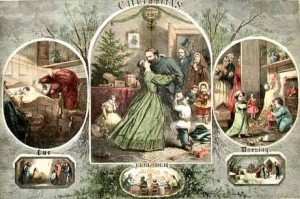Christmas dawns on nations engaged in fraternal warfare. The largely non-religious nature of the holiday at this time in American history is evidenced in relatively little discourse of religious nature. In army camps North and South, many soldiers feast on turkey and side dishes and engage in recreational activities. On the home fronts of both nations, the holiday celebration is muted by the absence of family members away in the army.
For some northern soldiers, the holiday is rather dull. One Minnesota soldier writes:
This Morning dawned very pleasant and the whole day, but it was a very dull Christmas for us…. the dulest Christmas that ever I spent in all my life and hope I never shall again. Being a soldier is not like being at home on that day. The boys in my mess got a lot of oysters and good fresh milk and made a good Soup of them. But I had to look on and see them ‘go in right’…. good ernest, as I am no oyster eater. I could not stand it to look on, so I pitched in and eat a lot of bread and Molasses, for a substitute for oysters.
In a holiday season unlike Christmases past, nervousness and unease permeates the land North and South. In the North, the failure of the United States to quell the southern revolt looms large despite the day’s celebrations. Meanwhile, the Confederate States, despite retaining the upper hand thus far on and off the battlefield, are struggling with mounting economic hardship.
Baptist voices of the South join the chorus of lamentations that damper what should be a season of joy and happiness. The editor of North Carolina’s Biblical Recorder aptly sums up widespread southern sentiments:
Today, (Wednesday,) is Christmas, the universal holiday of the civilized world, and we shall issue no paper next week. In these stirring times, when no one can tell what a day may bring forth, and when all are so eager to learn what is passing in the world, we are unwilling to suspend our labors even for a week. But this is the only holiday for editors and printers; we need rest and those who have labored so patiently and unremittingly in our office, during the past year need it also; and we bid adieu for one week to our readers, to our pen and scissors, and to our sanctum with its cares and perplexities. We go to our old home and friends for recreation, and hope to return, refreshed and invigorated for the labors of a new year.
To all our patrons, we wish a pleasant, — we can not say, a merry, Christmas. With our borders menaced by an unprincipled and blood-thirsty foe, our ports blockaded, and thousands of our friends, in arms far away, few will be inclined to indulge in the hilarity and festivities which usually mark this season. There will be a vacant seat around every hearth-stone and at every table; and on account of the absent loved one, exposed to danger, or, it may be, languishing in prison or in the hospital, or locked in the embrace of the deep and dreamless sleep of death, the joy of the family group will be mingled with sadness and its bright hopes with anxiety. To them all, we wish the cheerful resignation and calm expectancy which belong to those who, with unwavering trust, have committed themselves, their country and their all to God; and we hope that when Christmas returns again, every trace of war will have disappeared, and that independence, peace and prosperity will have crowned our country.
The hope for a war-free Christmas next will not be realized. And even after the war ends, another two decades will pass before many Baptists in America begin celebrating Christmas as a religious holiday.
Sources: “Christmas in the Camps Around Washington” (link); “A Soldier’s Christmas 1861,” Minnesota Historical Society (link); “Christmas,” Biblical Recorder, December 25, 1861 (link); image, “Soldiers’ Recollections of Christmas 1861,” The Civil War Monitor (link)



